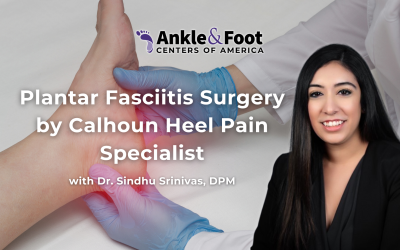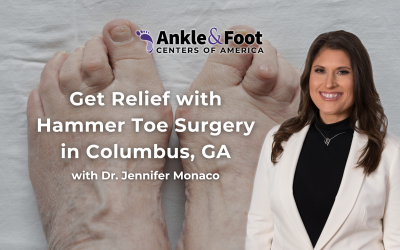Maintaining foot health is crucial for overall health and well-being, yet it is often overlooked until severe pain manifests. Morton’s Neuroma, a significant foot condition, profoundly impacts mobility and comfort due to its elusive nature and intense pain.
Dr. Kaufman, a distinguished podiatrist, specializes in treating various foot conditions and disorders, with a particular focus on Morton’s Neuroma. His expertise ranges from a deep understanding of foot anatomy to the utilization of innovative treatments such as custom orthotics and surgical interventions tailored to each patient’s unique needs.
Table of Contents
What is Morton’s Neuroma?
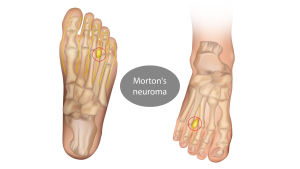 Morton’s Neuroma is a condition that affects the foot, often leading to significant pain. It is characterized by the thickening of the tissue around one of the nerves leading to the toes, usually between the third and fourth toes, causing a sharp, burning pain in the ball of the foot. The sensation can also mimic the feeling of standing on a pebble or fold in your sock. Understanding this condition is the first step toward effective management and relief.
Morton’s Neuroma is a condition that affects the foot, often leading to significant pain. It is characterized by the thickening of the tissue around one of the nerves leading to the toes, usually between the third and fourth toes, causing a sharp, burning pain in the ball of the foot. The sensation can also mimic the feeling of standing on a pebble or fold in your sock. Understanding this condition is the first step toward effective management and relief.
What Causes Morton’s Neuroma?
The exact cause of Morton’s Neuroma remains unclear, but it is believed to result from the compression and irritation of the nerve. Factors contributing to this compression include wearing tight or high-heeled shoes, certain sports activities that put pressure on the toes, and foot deformities such as high arches or flat feet.
Symptoms to Watch For
 Tingling, numbness, or pain in the ball of the foot.
Tingling, numbness, or pain in the ball of the foot.- A burning sensation that may extend to the toes.
- The feeling of walking on a small object or an uncomfortable fold in your sock.
Diagnosing Morton’s Neuroma
Diagnosis begins with a detailed medical history and a physical examination of the foot. Your doctor or healthcare provider may press on your foot to feel for a mass or tender spot, which can indicate the presence of a neuroma. Imaging tests such as ultrasound or MRI are sometimes used to confirm the diagnosis and rule out other conditions.
Why It’s Often Misdiagnosed
Diagnosing Morton’s Neuroma presents a complex challenge due to its symptom overlap with other foot ailments, including metatarsalgia and bursitis. Such commonalities between conditions often result in incorrect diagnoses and ineffective treatment strategies. Consequently, the expertise of a podiatrist, who specializes in foot and ankle disorders, becomes crucial for the precise identification and appropriate management of Morton’s Neuroma.
The Impact of Morton’s Neuroma
If left untreated, This condition can lead to permanent nerve damage. The chronic pain can affect your mobility, leading to a sedentary lifestyle. Early and accurate diagnosis is key to preventing these outcomes and ensuring effective treatment.
Preventive Measures and Lifestyle Adjustments
Preventing Morton’s Neuroma involves more than just doctors just treating the symptoms; it requires a proactive approach to foot health and lifestyle adjustments that can significantly reduce the risk of developing this painful condition. Dr. Kaufman and team emphasizes the importance of incorporating preventive measures and making informed lifestyle choices to maintain optimal foot health and avoid the factors that contribute to the development of Morton’s Neuroma.
Treatment Options Available in Roswell, GA
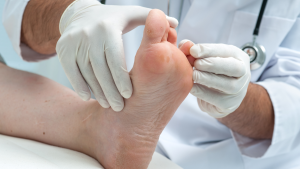 These treatments aim to alleviate the pressure on the nerve and reduce the pain and inflammation associated with the condition. Dr. Kaufman, leveraging his extensive experience in podiatry and sports medicine, outlines a multifaceted approach to managing Morton’s Neuroma, starting with the least and minimally invasive, methods and moving towards more direct interventions if necessary.
These treatments aim to alleviate the pressure on the nerve and reduce the pain and inflammation associated with the condition. Dr. Kaufman, leveraging his extensive experience in podiatry and sports medicine, outlines a multifaceted approach to managing Morton’s Neuroma, starting with the least and minimally invasive, methods and moving towards more direct interventions if necessary.
Consultation with a Podiatrist
Meeting with a skilled podiatrist is an essential part of achieving effective treatment for Morton’s neuroma. The level of training and experience held by the podiatric medicine practitioner significantly influences patient outcomes, as seen in the work of experts such as Dr. Richard Kaufman. As both a Foot and Ankle Surgeon and Wound Care Specialist, his expertise enhances results within podiatric medicine.
A Cornerstone in Morton’s Neuroma Management
One of the first lines of defense against the pain and complications of Morton’s Neuroma is the use of orthotics. Orthotics are specialized shoe inserts designed to correct foot posture and distribute pressure more evenly across the foot, thus reducing the stress on the affected nerve. For many patients, orthotics for Morton’s Neuroma can provide significant relief by simply altering the way their shoes fit and support their feet.
Dr. Kaufman notes, “Custom orthotics, tailored to the specific needs of the feet and the individual, can be remarkably effective in managing Morton’s Neuroma. They work by providing targeted support to the arch and padding to the ball of the foot, alleviating the direct pressure that exacerbates the condition.” Unlike over-the-counter options, custom orthotics are made based on precise measurements and assessments of the bones in a patient’s foot structure, ensuring a perfect fit and optimal function.
Alternative Non-Surgical Treatments
 In addition to orthotics, several other non-surgical treatments can be employed to manage symptoms, including:
In addition to orthotics, several other non-surgical treatments can be employed to manage symptoms, including:
- Physical Therapy: Engaging in physical therapy can help strengthen the muscles around the foot and improve mobility, potentially reducing the pressure on the nerve.
- Steroid Injections: For cases where inflammation significantly contributes to pain, administering corticosteroid or regenerative injections into the affected area can offer temporary relief from pain and swelling.
- Changes in Footwear: Simply switching to shoes with a wider toe box and lower heels can significantly reduce the pressure on the toes and the balls of the feet, offering immediate relief in many cases.
Dr. Kaufman emphasizes the importance of a comprehensive treatment plan: “While orthotics and other non-invasive treatments can provide relief, a holistic approach that includes lifestyle changes and patient education is essential for long-term management of Morton’s Neuroma.”
When Surgery Becomes Necessary
While a considerable number of patients find relief through non-invasive treatments such as orthotics, physical therapy, and lifestyle adjustments, some cases of Morton’s Neuroma may persist limiting mobility significantly. In these instances, surgery becomes a viable option. Dr. Kaufman emphasizes that the decision to proceed with surgery is not taken lightly and involves careful consideration of the patient’s condition, lifestyle, and the effectiveness of less invasive treatments.
Criteria for Considering Surgery
Dr. Kaufman outlines several criteria that might lead a physician to considering surgery:
- Persistent Pain: Despite exhaustive non-surgical interventions, the patient continues to experience significant pain that interferes with daily activities.
- Limited Mobility: The condition has progressed to the point where it significantly limits the patient’s ability to walk or participate in normal activities.
- Quality of Life: The patient’s quality of life is markedly diminished due to ongoing pain.
Types of Surgical Procedures
 Decompression Surgery: Aimed at patients with less severe symptoms, this surgery reduces pressure on the nerve by cutting surrounding ligaments, striving to maintain nerve function while easing discomfort.
Decompression Surgery: Aimed at patients with less severe symptoms, this surgery reduces pressure on the nerve by cutting surrounding ligaments, striving to maintain nerve function while easing discomfort.
Neurectomy: Recommended for more severe cases or when decompression surgery doesn’t provide relief, this surgery entails removing the problematic nerve segment. Although effective in alleviating pain, it can lead to permanent numbness in the affected area between the toes.
Preparing for Surgery
Before undergoing surgery, it’s essential to prepare both physically and mentally to ensure a smooth procedure and recovery. Here’s what you need to know:
- Consultation with Your Surgeon: Schedule a detailed discussion with your surgeon to understand the specific type of surgery planned, the expected outcomes, and any risks involved. This is the time to ask questions and express any concerns.
- Pre-Operative Instructions: Your surgeon will provide specific instructions to follow in the days leading up to your surgery. These may include guidelines on fasting, adjustments to your current medication regimen, and advice on avoiding certain activities or substances, such as smoking, which can affect surgery outcomes and recovery.
- Home Preparation: Prepare your home for your return from the hospital by placing essentials within easy reach and setting up a comfortable rest area. Since mobility will be limited, consider making modifications to your living space to prevent falls.
The Surgical Experience: From Operation to Recovery
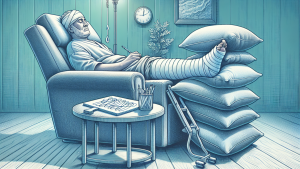 This surgery takes place in an operating room where local anesthesia allows patients to remain conscious. Overall, it spans about 30-60 minutes contingent upon the adopted approach. The surgeon relies on live imaging techniques to pinpoint and accurately manipulate instruments around the neuroma. Every aspect of this procedure, including setup and subsequent immediate care post-operation, is carefully orchestrated to maximize positive results for those undergoing treatment.
This surgery takes place in an operating room where local anesthesia allows patients to remain conscious. Overall, it spans about 30-60 minutes contingent upon the adopted approach. The surgeon relies on live imaging techniques to pinpoint and accurately manipulate instruments around the neuroma. Every aspect of this procedure, including setup and subsequent immediate care post-operation, is carefully orchestrated to maximize positive results for those undergoing treatment.
Post-Surgery Recovery for Morton’s Neuroma
Recovery from surgery varies depending on the specific procedure performed and the patient’s overall health. Dr. Kaufman stresses the importance of following post-operative care instructions closely, which typically include rest, elevation of the foot, and limited weight-bearing activities for several weeks. Rehabilitation may also involve physical therapy to restore strength and mobility.
Managing Post-Surgical Pain and Swelling
Post-operative care for the foot is vital to ensure a smooth recovery process. This entails giving the foot ample rest and maintaining it in an elevated position above the level of the heart, especially during the first week after surgery, a practice which helps the body alleviate pain and diminish swelling.
Conclusion
This guide, enriched with insights from Dr. Kaufman, a podiatrist specializing in foot health, has navigated through the complexities of Morton’s Neuroma, from its symptoms and causes to a broad spectrum of treatment options including non-surgical interventions, the critical role of orthotics, and when necessary, surgical solutions. Additionally, we’ve delved into the importance of post-surgery care and the preventative measures that can be adopted to safeguard against the condition.
Dr. Kaufman’s expertise highlights not just the immediate steps for treating the condition, but the long-term strategies for foot health maintenance. The emphasis on preventative care, through lifestyle adjustments and early interventions, serves as a cornerstone for not only managing Morton’s Neuroma but also enhancing overall foot health.
As we conclude, let us remember that rthotthe foundation of dealing with Morton’s Neuroma lies in acknowledging the symptoms early, seeking specialized care, and adhering to a holistic treatment approach that encompasses both immediate relief and preventive strategies. Dr. Kaufman’s message is clear: with the right care and attention, individuals can overcome the challenges of Morton’s Neuroma, leading to improved quality of life and mobility.

Schedule Your Consultation with Dr. Richard Kaufman Today
Take the first step towards addressing your foot and ankle concerns by scheduling a consultation with Dr. Richard Kaufman at Ankle & Foot Centers Of America. Whether you’re experiencing symptoms of Morton’s Neuroma or have other foot and ankle issues, Dr. Kaufman’s expertise can guide you towards an effective treatment plan tailored to your needs.
To book your appointment:
- Call Us: Reach out to us at Phone: 770-992-9980 to speak with our friendly staff and choose a convenient time for your consultation.
- Schedule Online: Prefer to book your appointment online? Visit our scheduling page at Piedmont Healthcare – Ankle & Foot Centers Of America and select the best slot for your consultation.
Don’t let foot and ankle issues hold you back any longer. Contact us today and take the first step towards improved mobility and comfort.
About Dr. Richard Kaufman
Dr. Richard Kaufman, a renowned Foot and Ankle Surgeon, Wound Care Specialist, and expert in treating Morton’s Neuroma, delivers unparalleled care to patients in Roswell, GA. His profound expertise and unwavering dedication to the practice of podiatry have garnered him prestigious recognitions, such as Fellowship in the American College of Foot and Ankle Surgeons, and Diplomate statuses with the American Board of Wound Management and the American Board of Podiatric Medicine.
Dr. Kaufman’s practice embodies a holistic approach to podiatry, with a special emphasis on the management and treatment of complex lower extremity wounds, foot and ankle reconstruction, Charcot foot and ankle deformity, advanced bunion surgery techniques, and notably, Morton’s Neuroma. His treatment of Morton’s Neuroma, in particular, demonstrates his commitment to utilizing the most innovative techniques available in podiatric medicine, incorporating state-of-the-art three-dimensional imaging and minimally invasive surgical procedures, to provide relief and solutions to patients suffering from this painful condition.
Based in Roswell, GA, Dr. Kaufman’s clinic is a hub for a comprehensive array of podiatric services. His professional interests are diverse, covering lower extremity wound care, reconstructive surgery, treatments for Charcot foot and ankle, skin grafting, ankle fusion surgery, total ankle replacement, bunion surgery, and specialized care for Morton’s Neuroma. Through his blogs and dedicated patient education initiatives, Dr. Kaufman disseminates valuable knowledge across various topics, including effective strategies for managing ankle sprains, thereby solidifying his reputation as a leading authority in foot and ankle healthcare.
Frequently Asked Questions (FAQs) about Morton’s Neuroma
What is the best treatment for Morton’s neuroma?
 To effectively treat Morton’s neuroma, it is recommended by surgeons to employ strategies such as modifying activities that exacerbate the condition, utilizing anti-inflammatory drugs, administering injections of corticosteroids, wearing appropriate shoes that alleviate pressure, implementing custom-made orthotics for support and cushioning and applying cold therapy to reduce inflammation in the affected area.
To effectively treat Morton’s neuroma, it is recommended by surgeons to employ strategies such as modifying activities that exacerbate the condition, utilizing anti-inflammatory drugs, administering injections of corticosteroids, wearing appropriate shoes that alleviate pressure, implementing custom-made orthotics for support and cushioning and applying cold therapy to reduce inflammation in the affected area.
Are you awake for Morton’s neuroma surgery?
Certainly, during surgery for Morton’s neuroma, the patient may remain conscious with their foot numbed as the procedure is carried out. This facilitates employing a local anesthetic rather than necessitating general anesthesia.
What is the success rate of Morton’s neuroma surgery?
The success rate of Morton’s neuroma surgery varies significantly, between 55% and 95%, influenced by aspects like the surgeon’s skill level and the specific technique used for the procedure performed. Speaking, this kind of surgery tends to have a comparatively high likelihood of success.
How long does it take to recover from Mortons neuroma surgery?
Typically, a period of 8-12 weeks is necessary for healing and recuperation following surgery for Morton’s neuroma, with rehabilitation often involving physical therapy.
When does surgery become necessary for Morton’s Neuroma?
When conservative treatments such as altering shoes, using orthotics, and medication fail to alleviate persistent pain and functional difficulties associated with Morton’s Neuroma, surgery may be required.

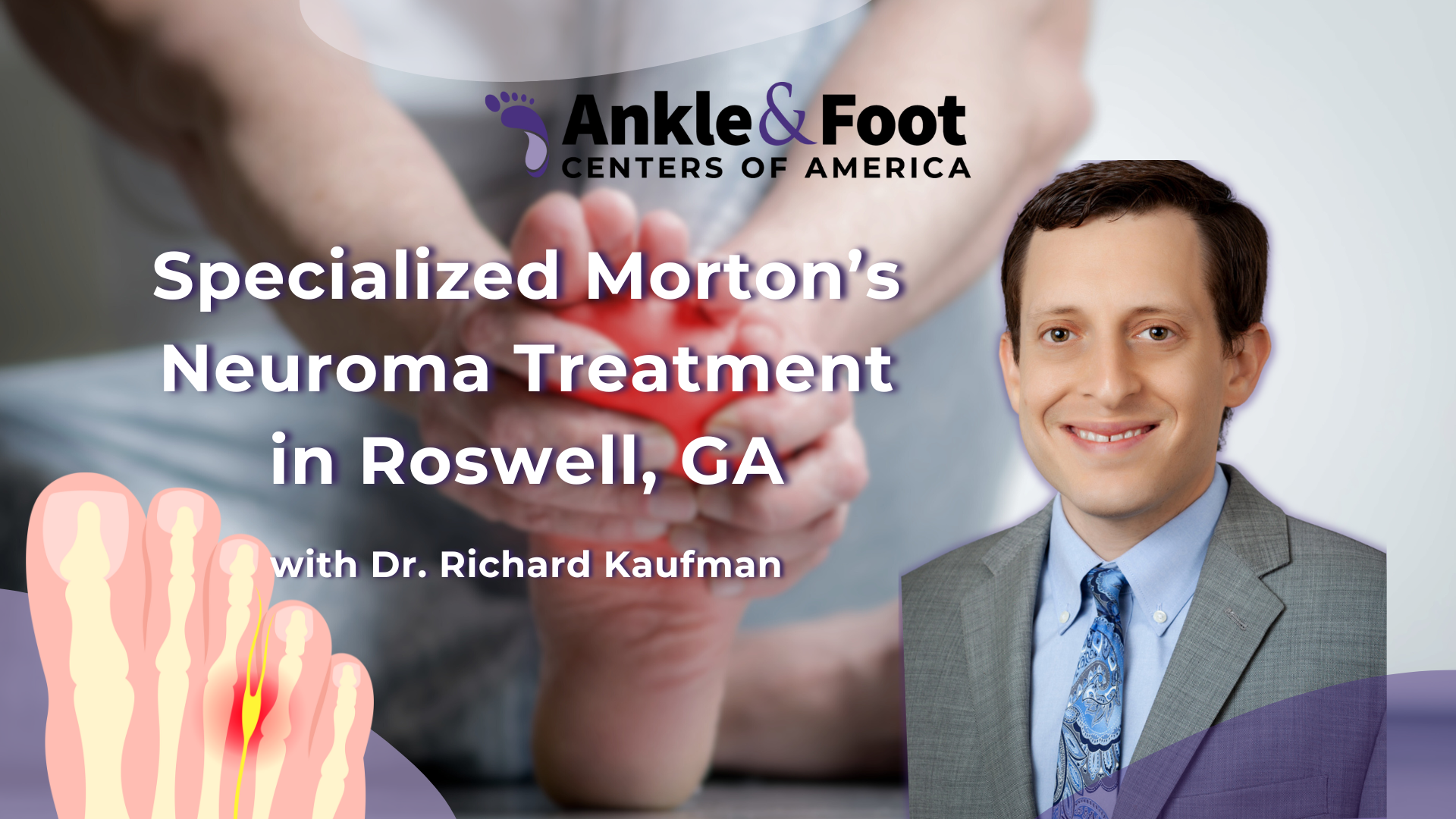
 Tingling, numbness, or pain in the ball of the foot.
Tingling, numbness, or pain in the ball of the foot.

